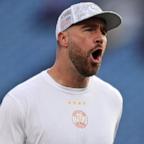Like Iowa (which held its Republican caucuses last week), New Hampshire's distinct character has been a selling point for its first-in-the-nation status. People in New Hampshire expect to meet their presidential candidates, the cliché goes, giving candidates a chance to show off their retail campaigning skills. But New Hampshire's unique character — its smaller towns, independent political streak and relatively homogenous demographics — have also been cited as a drawback. This raises a question: How nationalized are New Hampshire's politics? Are voters in the Granite State asking about issues of local concern, or about big national topics like abortion rights, Trump's indictments and foreign policy?
In some ways, New Hampshire seems to march to the beat of its own political drum. Measured by DW-NOMINATE scores, its all-Democratic congressional delegation is on the moderate side. Among the handful of other states that also have all Democrats representing them in Congress, most also have a Democratic governor — but New Hampshire has a Republican governor. And in 2016, on a night that was largely disappointing for Democrats, New Hampshire narrowly elected Democrat Maggie Hassan to the Senate, and Hillary Clinton won the state, despite the trends among rural white voters toward the GOP, which drove Clinton's losses in several other close states (Wisconsin, Pennsylvania, and Michigan) — higher rates of college degrees may have had something to do with that.
Looking at past elections makes this even more interesting. Until 2016, New Hampshire had voted with the winner in nearly every presidential election since 1976. In the 1980s, Republican presidential candidates were strong there, but Bill Clinton won the state twice in the 1990s. Then it went for George W. Bush once — but Kerry in 2004 — then twice for Barack Obama.
It's possible that New Hampshire still goes its own way politically — but it's also possible that, as the Northeast becomes more Democratic (and the greater Boston area spills out into more of the state), New Hampshire is actually becoming less of a politically distinct place, and more like a typical place that's closely divided but pretty consistently blue (like Colorado).
—Julia Azari, 538 contributor








